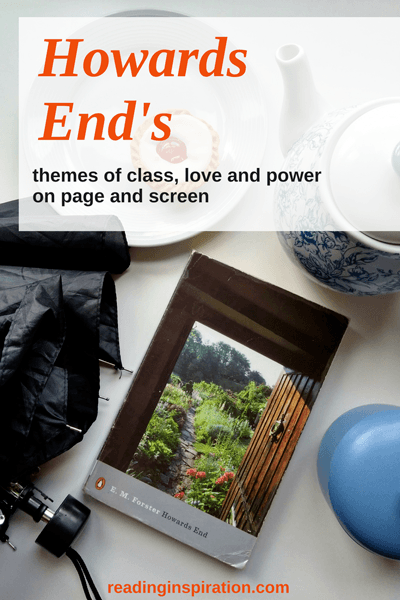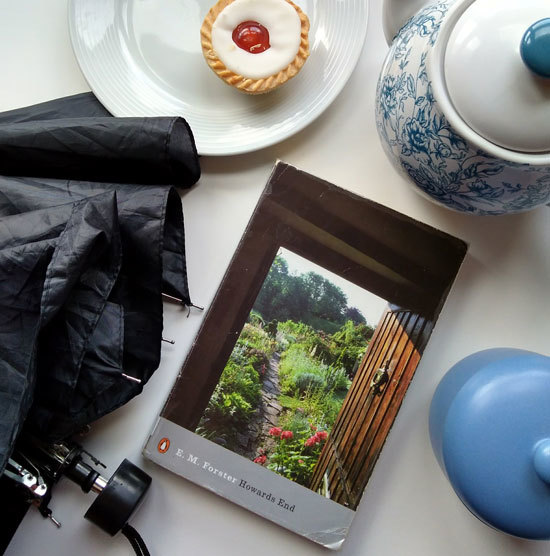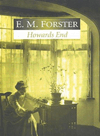Howards End’s themes of class, love and power resonate with readers & viewers today
It’s time to take a look at a great read for the grown-ups! As well as making us happier, seeing adults reading helps encourage kids to read too. So curling up with a good book is a double bonus if you are a parent or caring for children!
This post may contain compensated links. Read my disclaimer hereI’ve been re-reading the classic Howards End by E.M. Forster. I first read this book while studying English Literature A Level over 20 years ago and was interested to see how my impressions of the themes in Howards End may have changed.
Forster’s book has inspired a film, two TV series, a radio adaption, a theatre reproduction and an opera. Zadie Smith’s novel, On Beauty, paid tribute to it in a contemporary setting.
Revisiting the story of the cultured Schlegel sisters, the conservative Wilcox family, the downtrodden Basts – and the relationships between the lot of them – brings fresh insights every time.
Please note this Howards End review discusses the themes of the book in detail – there will be spoilers ahead.
There’s a lot going on in the novel Howards End. It’s got class, gender, power and money. Not to mention “telegrams and anger”, lost umbrellas and Beethoven’s Fifth Symphony forming a backdrop to the drama of it all. Let’s break it down a bit…
A discussion of Howards End’s themes of conflict and resolution
Politics and gender
Arguably the central theme of Howards End is what happens when relationships grow between people who have very different attitudes and values. Their attractions to each other may struggle to endure the gaping differences between their opinions and ways of living.
The Wilcoxes believe in imperialism and commerce and that class division serves a purpose in the world. Henry Wilcox’s attitude toward the poor is that they merely exist and there is nothing to do about it. “The poor are poor, and one’s sorry for them, but there it is.”
The Schlegels – particularly Helen – believe that the rich have responsibility and should assist the poor as much as possible. Henry sees this attitude as sentimental.
Socialism and suffragettes
The Wilcoxes are also a family in which men look after and control women in every practical aspect. On the contrary, the Schlegel sisters interests include socialism and the suffragettes. They live independently on their inheritance looking after their younger brother.
The Wilcox men would like to look after women every step of the way. The Schlegel women don’t need men to cope with the practicalities of everyday life. They only feel lacking in masculine influences during social occasions.
Margaret complains to Tibby that he should play the host instead of having screaming women swamping visitors like Mr Bast. She describes their home as “irrevocably feminine,” arguing the whole atmosphere contributes to these qualities.
Margaret comments that a certain other household they know of is “irrevocably masculine,” referring to the Wilcoxes. While there are women in the family the household has a masculine air. Outside of work, the family’s interests are sport, motoring and hunting. The daughter Evie shares these interests.
On the other hand music, art and literature are of interest to the Schlegels, including their brother Tibby. These pursuits are characterised as feminine.
Class and means
The novel explores the division between those who have the means to live cultured lives and those who do not. The introduction of Leonard Bast explores this problem. The Schlegel sisters find Leonard interesting because he strives to improve himself intellectually despite his low income.
The sisters are of interest to Leonard to further explore the world of Romance – of books and culture. But their interest in his work and finances are disappointing to him. In fact, their attempts to assist him, with advice from Henry Wilcox, leads Leonard’s situation to be dramatically worsened.
There is also conflict between the Schlegels and the Wilcoxes over wealth and financial means. Although Henry Wilcox is wealthy he expects his sons to do well independently of his support. Charles Wilcox sees the Schlegels as a threat to his inheritance.
However, financial concerns are low for the Schlegels – not just because they care more about art and culture – but because they have a generous allowance to live on already. Their inheritance has left them financially secure.
City vs country
The book explores contrasting values embodied in city and country life. It places a great deal of emphasis on a sense of place throughout the narrative. While Howards End’s characters grow and develop, they physically move about Britain.
“Everyone moving,” is Henry’s observation at a turning point in the narrative. He is referring to physically moving homes. But the characters are on the move in their personal development too and are trying to find the place where they belong – emotionally as well as physically.
The Schlegels have lived their whole life at Wickham Place in London, but soon they will have to move on. This upheaval comes at a difficult time as the sisters make choices in their relationships with others.
The lack of stability afforded by their family home contributes to the splintering of the sister’s relationship with each other.
The Wilcoxes are also an unsettled family. They own – but are not really at home at – several properties in different locations. The Howards End house has come to them through Henry’s wife Ruth. After she dies, the property won’t do for him.
He complains it is “neither one thing nor the other” and leases it to tenants. With his daughter Evie, he moves about between a London property on Ducie St and a Shropshire country property – Oniton. Eventually, he settles at Howards End – through no plan of his own – but through the twists and turns of the plot.
A bridge
It turns out being neither the city or the country does make Howards End the perfect place of compromise and a bridge between the two. The home is symbolic of the two women who are emotionally attached to it – Ruth Wilcox and Margaret Schlegel – who both act as a bridge between the conflicting opposites of the narrative.
The growth and change of the city of London is also a major theme, and Helen Schlegel observes London is creeping towards Howards End in Hertfordshire.
Throughout Howards End, characters reflect on the rapid pace of change in London, with new buildings being thrown up constantly. The novel was written in the early 1900s, but these observations ring true for Londoners today.
Emotion vs Pragmatism
Their approach to day-to-day life also highlights the contrasts between the Schlegels and the Wilcoxes. Emotion drives the Schlegels decisions; while the Wilcoxes are practical and forceful.
However, the practicality of the Wilcoxes is eventually exposed as insensitive and clumsy. When they are not anchored by Ruth Wilcox’s emotional force they threaten to unravel.
The forcefulness and entitled attitude of Charles is his eventual undoing. Margaret re-establishes balance in Henry’s life and is able to save him.
” ‘You are not as unpractical as you pretend. I shall never believe it.’
Margaret laughed. But she was—quite as unpractical.”
Despite this discussion of Margaret’s impractical character, she is ultimately more practical than Henry. On their engagement, Margaret is able to talk about her finances openly to Henry. Later she demands Henry talks frankly about his behaviour.
When the couple runs into difficulties, it is Margaret who takes control and looks after Henry as he falls apart. It is because Margaret embraces both reason and emotion that she enables their relationship to survive both of the crises that threaten it.
After Helen and Henry have been at loggerheads for much of the novel, Margaret enables their friendship to grow. Helen and Henry are on two sides of the coin of emotion and cool practicality.
Like the house at Howards End, Margaret represents a compromise. She creates a bridge between extremes and brings the two sides to a position where they can mutually appreciate and trust each other.
The language of culture vs sport
The Schlegels’ language is that of art, music and culture, while the Wilcoxes’ is the language of the hunt, sport and winning. Prose and poetry also describe the different language of the families.
When Henry persuades Margaret to trick Helen into going to Howards End to speak to her, Margaret objects that this action is “not the particular language that Helen and I talk.” The expedition to entrap Helen becomes that of a hunting party, and Helen is the prey.
Only Connect – Howards End bridges the divides
“Only connect the prose and the passion, and both will be exalted, and human love will be seen at its highest. Live in fragments no longer…
By quiet indications the bridge would be built and span their lives with beauty.
But she failed. For there was one quality in Henry for which she was never prepared, however much she reminded herself of it: his obtuseness.”
Margaret’s driving force is to encourage people to love and connect or be at loggerheads.
At this point, quite early on in their relationship, Margaret fails to enable Henry to connect prose and poetry, emotion and reason. But later she is able to nurture him back together and to a point where he is able to make compromises and to live in fragments no longer.
Howards End and Margaret – although being more connected to the countryside than the city, and more connected to emotion than reason – represent compromise. They are able to form a bridge into the Wilcox’s world to save them.
The role of Leonard Bast in the novel however, is a bit of a loose end. The poor man has striven to improve himself intellectually. But after the whims of the practical capitalist world destroyed him financially, he loses his will to struggle.
Having lost his job Leonard surrenders his pursuit for all things beautiful. Helen tries to get him to connect back to this, but her attempts end in tragedy for Leonard.
Scandals
Henry, his wife Margaret, her sister Helen and Helen’s child eventually settle down as an unusual family unit living at Howards End. It may seem like quite a daring arrangement for the time.
When Helen’s pregnancy was first discovered there was a lot of concern among the Wilcoxes about clearing Helen’s name and the potential scandal that could reverberate on the family. But in the end none of this matters.
The greater scandal of a jailed son has overshadowed the family. London is encroaching on Hertfordshire across the fields.
Helen’s child being able to live peacefully with the family at Howards End is symbolic of a time of change coming to England, and of compromise between the Schlegel and Wilcox way of life.
Connections have been made, conflicts resolved and all is now well for the main characters. Except for Leonard of course, but more on his tragic fate coming up.
On screen
As Forster’s novel has made it to screen several times I am going to explore some of the different ways Howards End’s themes come across in these adaptions.
The Howards End film made by Merchant Ivory in 1992 is quite accurate to its source. Most of the dialogue is used verbatim from the text, though sometimes the venues and timings of conversations are moved.
However, one missing aspect is an important conversation between Helen and Margaret which takes place in the closing pages of the book. In their conversation they reflect on the growing friendship between Helen and Henry.
The Howards End movie leaves out all indication of the growing friendship between Henry and Helen. This lends the end of the film a slightly sadder tone.
The film also diminishes the role of Helen’s and Paul’s failed relationship in Helen’s development. In the book, Helen and Margaret discuss this connection when they are reunited at Howards End. The film also portrays Helen’s interactions with Leonard as more romantic and loving than in the book.
Forster’s novel states that at times Leonard is unable to distinguish between the two sisters. Instead, he sees them as a homogeneous unit representing Romance and culture.
Missed interactions
The film skips the interaction between Margaret and Leonard as they walk back from hearing Beethoven, minimising Margaret’s interactions with Leonard and focusing attention on Helen’s preoccupation with him.
Leonard’s feelings for Helen allows him to emerge as a more sympathetic character and his death becomes more tragic. In the book, Leonard is going to find Margaret to confess his sins to her when he travels to Howards End. However, in the film, his urge to find Helen is his motivation.
The sense of a deeper connection between Helen and Leonard makes the death of Leonard more painful in the 1992 film than in the book. The book however, ends with a sense that all has ended quite well for its main characters.
Leonard’s death is part of a process that creates a balance between the Schlegels and the Wilcoxes. To a contemporary audience, this would be a callous conclusion.
The portrayal of Jacky Bast
In the 2017 BBC adaption for TV, Jacky Bast’s portrayal is less harsh than in both the book and the 1992 film. In the latter two versions, the Schlegel sisters treat Jacky as something of a joke. The book sees Helen as being particularly merciless to Jacky, referring to her as Mrs Lanoline and mocking her manner of speaking.
Seeing the upper-class family laughing at a lower-class woman would surely reduce the sympathy towards them to a contemporary audience. In the 2017 adaption, the portrayal of the working class woman is more sympathetic and the Schlegels take her visit more seriously.
The Schlegel sisters wear red clothes much of the time in the 2017 adaption, suggesting the characters as a truly radical force against the conservative world of the Wilcoxes.
Margaret tones down her shades of red as her relationship with Henry grows. The 2017 version is also more relevant to a contemporary audience in its inclusion of non-white actors and characters.
The BBC adaption uses license to develop Forster’s characters, including extra dialogue and interaction not present in the film. For example, Charles and Henry tell Margaret she will want to clean up after her drive to Oniton, despite her protestations that she would rather go for a walk.
This license fits perfectly with the character’s status and interactions – the Wilcox men want to look after women and Margaret does not need to be looked after. However, after her initial objections, she is willing to go along with and humour their need to look after her.
The 2017 TV adaption went down well with viewers. The themes of Howards End – political conflict within personal relationships, class, inequality, money and power are still significant in today’s political and cultural landscape.
Read or watch Howards End
Get the book, movie, or TV series. And if you are looking for an ideal gift for the Forster fan in your life, special editions of Howards End and Forster’s collected works are also available.
Over to you
What do you think of Howards End? Are you a fan of the book, the film or the recent TV series? Do you disagree with my thoughts on them? Let me know in the comments below.
If you enjoy bookish discussions like this, check out more articles on books for the grown-ups here including great summer reads.
– Find awesome books at readinginspiration.com –
If you comment on this website your email address will not be published. Additionally, your comment data is never used for marketing purposes. Required fields are marked *
Your privacy is important to us: check out our Privacy Policy here to find out about how data protection is undertaken on this website.
Disclaimer: As an Amazon Associate I earn from qualifying purchases.













